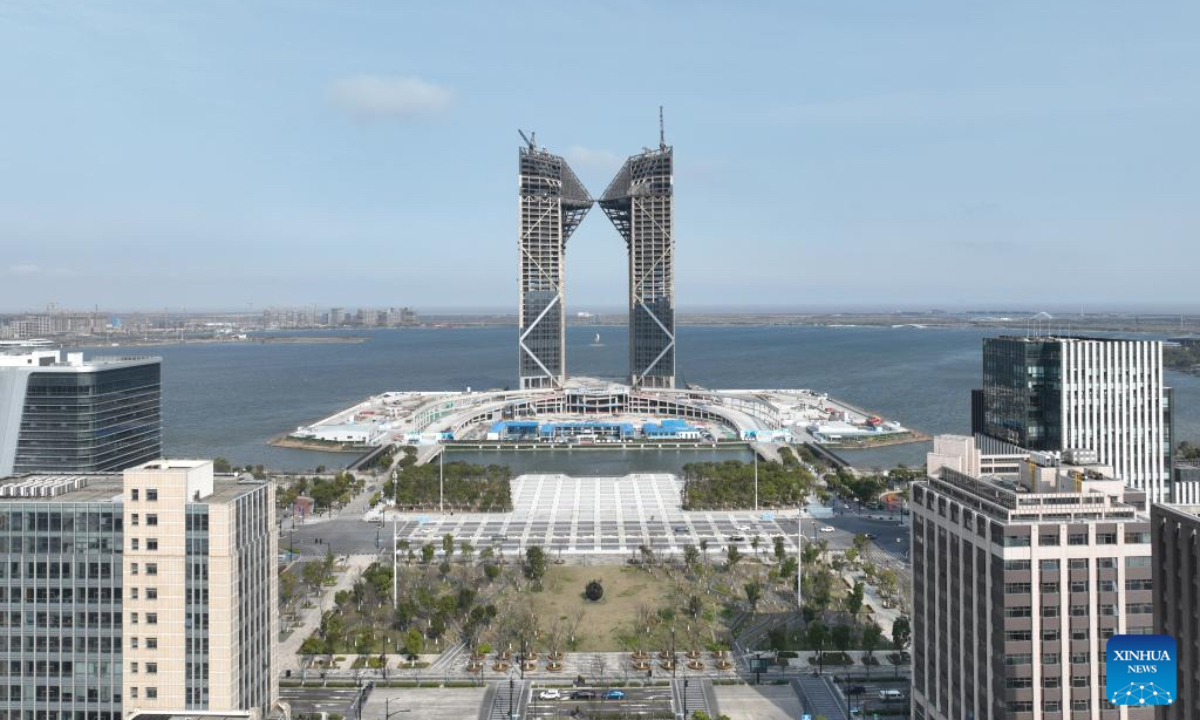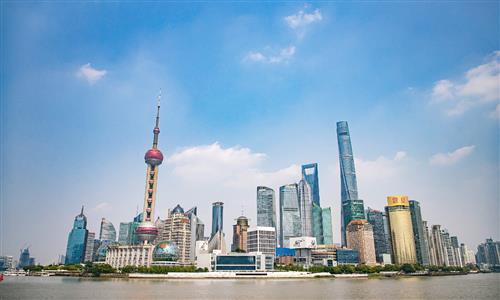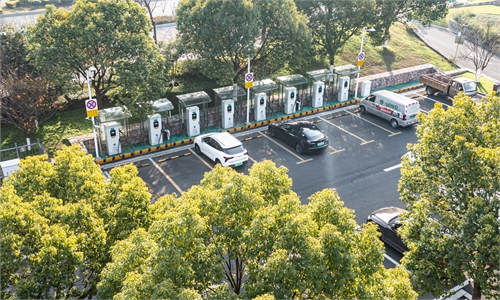Lingang New Area of Shanghai FTZ marks 5th anniversary; Meteoric development squarely rebuts decoupling, ‘de-risking’ push against China
Meteoric development in opening-up squarely rebuts West’s ‘decoupling,’ ‘de-risking’ push against China

An aerial drone photo taken on March 27, 2024 shows a construction site at Lingang new area of the China (Shanghai) Pilot Free Trade Zone in east China's Shanghai. Photo: Xinhua
The Lingang New Area of the China (Shanghai) Pilot Free Trade Zone (FTZ) will mark its fifth anniversary on Tuesday. While hailing the event as a milestone in its development, observers said that the growth of the area, now home to numerous advanced manufacturers including Tesla's first overseas gigafactory and the production base for China's first self-developed large passenger aircraft C919, is an epitome of the country's unswerving efforts to comprehensively deepen reform and high-level opening-up.
The meteoric development of the coastal area also squarely rebuts certain Western countries' "decoupling" and "de-risking" push against China, analysts said, highlighting the 45.3 percent expansion of the area's annual actual utilization of foreign direct investment. The figure also showed that global multinationals are increasingly counting on China as a commercial stalwart, and that China has become an irreplaceable and pivotal part of the global supply chain, especially in high-tech manufacturing, they said.
The second final assembly plant for the C919 aircraft will be built in Lingang New Area, with a total construction area of 330,000 square meters and a total investment of 11.95 billion yuan ($1.67 billion), news website chinastarmarket.cn reported on Monday. It is expected that the factory's annual production capacity will reach 150 units by 2027, when the production line will run at full capacity.
"This would mark another moment for the development of high-end manufacturing in Lingang, taking advantage of the area's pioneering role across a number of sectors ranging from the financial services and leasing industries, to systemic opening-up. It also aligns with China's ongoing drives to upgrade industries and make innovation a key engine of the national economy," Cong Yi, a professor at the Tianjin School of Administration, told the Global Times on Monday.
The construction of the assembly plant adds to a number of buoyant results achieved since the Lingang New Area was inaugurated on August 20, 2019.
In June, the Boeing Shanghai Aviation Services Co announced groundbreaking for its new facility in the area, which the company said aims to "leverage the unique regional and policy advantages" of the area, according to a statement the company sent to the Global Times. With a total investment of 850 million yuan, the facility is anticipated to be completed by the end of 2025.
"It is not an exaggeration to say that those developments in the area offer a vivid example of how China's continued deepening reform and opening-up will build an efficient institutional system that aligns with international standards and leads the country to a path of high-quality development," Cong said.
He said that the Lingang New Area is also a demonstration zone, where practical experience of innovation in systems and opening-up would be gradually applied in other Chinese cities.
Over the past five years, the Lingang New Area's annual output value of industries above a designated size exceeded 400 billion yuan, and its regional GDP rose at an annual average rate of 19.8 percent, according to a report by news portal thepaper.cn last week.
The region has blazed trails in opening-up, including trade liberalization, free flows of resource elements and foreign exchange management, which observers said sent a resounding signal on "China's unwavering commitment to make its door open wider and wider to the outside world."
In a latest move, an executive meeting of the State Council, presided over by Premier Li Qiang on Monday, reviewed and approved four documents including the 2024 edition of a set of special administrative measures - a negative list - for foreign investment access.
According to the negative list, China will relax restrictions on foreign investment further by completely abolishing entry barriers in the manufacturing sector, while accelerating the opening up of sectors such as telecommunication, education and health care services.
In May, US carmaker Tesla broke ground on a mega factory in Shanghai to manufacture its energy-storage batteries, Megapacks, making it the first energy storage megaproject outside the US.
The plant is expected to start mass production in the first quarter of 2025. The gigafactory of Tesla, the first solely foreign-invested car manufacturing project in China, was put into operation in 2018.
"The overwhelming interest among foreign companies, including those from the US, in investing in China, also showed that certain countries' 'decoupling' and 'de-risking' push is futile, and those attempts won't sway China's appeal as a favorable foreign investment destination," Cong said.
He added that the "industrial cluster effect of high-end manufacturing" also played a role in drawing foreign companies into the Chinese market, which further fortifies China's pivotal role in the global supply chain.




